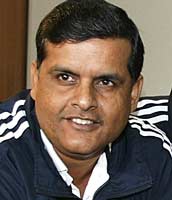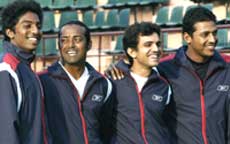|
|
| Help | |
| You are here: Rediff Home » India » Sports » Tennis »
PTI >
Report |
|
| |||||||||||||||||||||||
|
| |||||||||||||||||||||||
 Former Davis Cup captain Ramesh Krishnan feels India will have to overcome the dilemma about playing on grass in order to put themselves in the best frame of mind ahead of the crucial World Group play-off against Sweden later this year.
Former Davis Cup captain Ramesh Krishnan feels India will have to overcome the dilemma about playing on grass in order to put themselves in the best frame of mind ahead of the crucial World Group play-off against Sweden later this year.
Krishnan said the surface was less a factor than the lack of high ranked players for India's stagnation in the zonal group in recent years.
"Playing on grass is your home court advantage. Grass is definitely our preferred choice," Krishnan said.
"I do not know whether it (over dependence on grass) is counter productive but our present players are not ranked as high as our players of 1980s and 1990s. That is the issue."
India host Sweden in September in the play-off, and the winner gets promoted to the World Group next year.
India have the right to decide on the surface but Sweden have top ranked players strong on grass, the hosts' traditional strength.
Krishnan said the Indian team should begin their preparations for the tie soon.
"Davis Cup ties require lot of physical energy. One has to be ready to go the distance. In Davis Cup play, one needs little more of endurance than in other events.
"They have to gear themselves two-three months before. Even now it should be at the back of the mind of players and build towards that."
India have a poor head to head record against Sweden, having lost in all the four previous meetings including twice on grass at home. In fact, the Swedes whitewashed Indians on three of those occasions. Vijay Amritraj's win over Mats Wilander in Bangalore in 1987 being India's only victory in 20 rubbers.
Krishnan, who was in the two losing sides (in 1985 and '87), was in awe of the team's domination.
"They were clearly a better team and they defeated us in India twice on grass. They are also a good Davis Cup nation," he said.
"They are not only better players but they all come well prepared. It is a combination of both."
Krishnan said modern generation of players do not play many tournaments on grass but still India should roll out a 'green carpet' welcome for the visitors in September.
"Other than Davis Cup, none of our domestic or the ITF events are played on grass. Our kids do not play on grass at all.
"It is only in the Davis Cup thats we use it because we feel it is to our advantage. We are a grass playing nation.
"Even Great Britain and Australia, two traditional grass court nations, play their Davis Cup matches on other surfaces too. I would say it is not counter productive because our kids per say do not play on grass.
Krishnan said although surface played a crucial role in a team's success, there were other factors that made the difference between victory and defeat.
"It is a question of how a player considering his style of play adapts his game to a particular surface. At the highest level, adaptability is more important."
 He said the youngsters should rise upto the occasion as Leander Paes [Images] and Mahesh Bhupathi [Images] were on the verge of calling it a day.
He said the youngsters should rise upto the occasion as Leander Paes [Images] and Mahesh Bhupathi [Images] were on the verge of calling it a day.
"I would say that our team is in transition. Leander and Mahesh are slowly on their way out but still you cannot count them out.
"They are still doing well in the doubles. It is good that they can pass on some of their experiences to the youngsters in the team. More importantly, the youngsters should take advantage of the situation."
Krishnan was of the opinion that though more and more children were taking to tennis, the huge numbers was yet to translate into quality.
"Sania Mirza [Images] is playing in the French Open and many kids are also playing the junior events. As far as Sania is concerned, she has come through the system.
"I do not want to mislead people. I think the quality needs to be raised, particularly in the men's side.
"We have not had anyone playing in the Grand Slam singles events for a long time. It is important that somebody gets to that position, which were used to for many years in a row.
"I hope a youngster comes through and does it sooner than later."
The former Davis Cupper was of the opinion that roping in a foreign coach for the Indians was a very expensive proposition.
"Who is going to foot the bill? As for Davis Cup, it is played only for three weeks in a year or four weeks at the most. I want to dispel the notion that foreign coaches are good and Indian coaches are bad. There are bad foreign coaches also.
"Good coaching in today's world does not come cheap. All these cost lot of money. It is a deep subject. At the same time there is no denying the fact that our children need good coaching."
| © Copyright 2008 PTI. All rights reserved. Republication or redistribution of PTI content, including by framing or similar means, is expressly prohibited without the prior written consent. |
|
|
| © 2008 Rediff.com India Limited. All Rights Reserved. Disclaimer | Feedback |